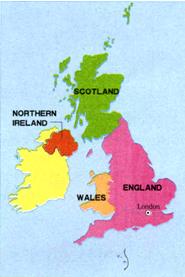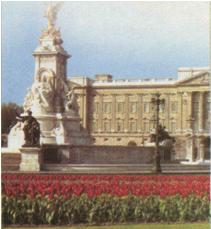-
(单词翻译:双击或拖选)
People may wonder why different words are used to describe these four countries: England, Wales, Scotland1 and Northern Ireland. You can clarify2 this question if you study British history.



First there was England. Wales was linked to it in the thirteenth century. Now when people refer to England you find Wales included as well. Next England and Wales were joined to Scotland in the seventeenth century and the name was changed to "Great Britain". Happily this was accomplished3 without conflict when King James of Scotland became King of England and Wales as well. Finally the English government tried in the early twentieth century to form the United Kingdom by getting Ireland connected in the same peaceful way. However, the southern part of Ireland was unwilling4 and broke away to form its own government. So only Northern Ireland joined with England, Wales and Scotland to become the United Kingdom and this was shown to the world in a new flag called the Union Jack5.

To their credit6 the four countries do work together in some areas (eg, the currency and international relations), but they still have very different institutions. For example, Northern Ireland, England and Scotland have different educational and legal systems as well as different football teams for competitions like the World Cup!
England is the largest of the four countries, and for convenience it is divided roughly7 into three zones. The zone nearest France is called the South of England, the middle zone is called the Midlands and the one nearest to Scotland is known as the North. You find most of the population settled in the south, but most of the industrial cities in the Midlands and the North of England. Although, nationwide, these cities are not as large as those in China, they have world-famous football teams and some of them even have two! It is a pity that the industrial cities built in the nineteenth century do not attract visitors. For historical architecture you have to go to older but smaller towns built by the Romans. There you will find out more about British history and culture.
The greatest historical treasure of all is London with its museums, art collections, theatres, parks and buildings. It is the centre of national government and its administration8. It has the oldest port built by the Romans in the first century AD, the oldest building begun by the Anglo-Saxons in the 1060s and the oldest castle constructed by later Norman rulers in 1066. There has been four sets of invaders9 of England. The first invaders, the Romans, left their towns and roads. The second, the Anglo-Saxons, left their language and their government. The third, the Vikings, influenced the vocabulary and place-names of the North of England, and the fourth, the Normans, left castles and introduced new words for food.
If you look around the British countryside you will find evidence of all these invaders. You must keep your eyes open if you are going to make your trip to the United Kingdom enjoyable and worthwhile.


点击 收听单词发音
收听单词发音
 收听单词发音
收听单词发音
1
Scotland

|
|
| n.苏格兰 | |
参考例句: |
|
|
|
2
clarify

|
|
| v.澄清,阐明,使变得清晰;净化 | |
参考例句: |
|
|
|
3
accomplished

|
|
| adj.有才艺的;有造诣的;达到了的 | |
参考例句: |
|
|
|
4
unwilling

|
|
| adj.不情愿的 | |
参考例句: |
|
|
|
5
jack

|
|
| n.插座,千斤顶,男人;v.抬起,提醒,扛举;n.(Jake)杰克 | |
参考例句: |
|
|
|
6
credit

|
|
| n.信用,荣誉,贷款,学分;v.归功于,赞颂,信任 | |
参考例句: |
|
|
|
7
roughly

|
|
| adv.概略地,粗糙地,粗鲁地 | |
参考例句: |
|
|
|
8
administration

|
|
| n.经营,管理;行政,行政机关,管理部门 | |
参考例句: |
|
|
|
9
invaders

|
|
| 入侵者,侵略者,侵入物( invader的名词复数 ) | |
参考例句: |
|
|
|

















